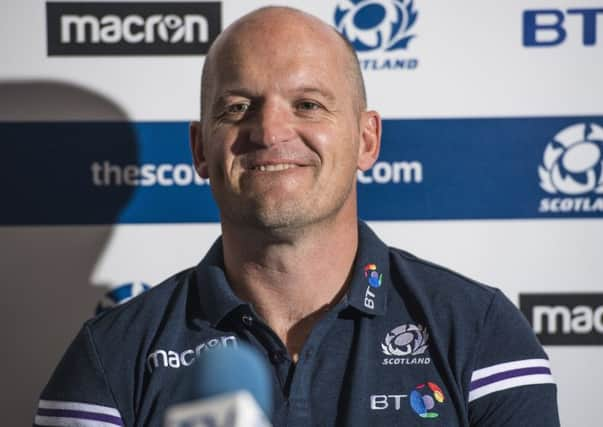Big names missing but Scotland squad encourages optimism


It used to be different in the amateur days. There was one case, I remember, of a schoolmaster who was surprised to receive an invitation to play in a Murrayfield trial, surprised , first, because he was English, and, second, because he turned out only occasionally for his club’s second XV somewhere in the Midlands. It transpired that the selectors had intended the invitation to go to a player of the same name who played for, I think, Edinburgh Wanderers.
Nowadays it’s the omissions rather than the inclusions that may surprise, especially when Gregor Townsend’s training squad for the autumn internationals is without players who are injured or recovering from operations. Some of these – Stuart Hogg and the Brothers Gray – would, one assumes, be first choices if fit. So it’s the omission of Matt Scott, Ruaridh Jackson, Josh Strauss and Duncan Weir which catches the eye, all the more so because the first three were on the summer tour.
Advertisement
Hide AdAdvertisement
Hide AdStrauss was one of Townsend’s stalwarts at Glasgow and, in the continued absence of the too-often injured David Denton, remains our most powerful ball-carrier. Scott has flourished since he moved south to Gloucester and is a proven try-scorer at international level too; he may reasonably be aggrieved to see Edinburgh’s Phil Burleigh, who has just qualified for Scotland on residential grounds, preferred to him.
Jackson and Weir disputed the fly-half berth for several years before Finn Russell came on the scene. It’s perhaps fair to say that both have had enough chances. It must count against Jackson that in his seasons in the south with, first, Wasps and then Harlequins, he failed to nail down a first-team place. He is a player I have always liked but, sadly, one who has rarely delivered at top level.
Weir had a wretched first season with Edinburgh, the Welshman Jason Tovey being often preferred to him for the big games. Nevertheless, what probably counts most against him is that he is a rather old-fashioned fly-half, who usually likes to take the ball well behind the gain-line and is not best-suited to the high-tempo passing , off-loading and supporting game that Townsend likes his teams to play; he resembles Craig Chalmers rather than Gregor himself.
Strauss isn’t perhaps best suited to that style of game either, because he almost always goes to ground. Yet he is a hard man to stop, and well though Scotland played in last season’s Six Nations when he was out injured, and well though Ryan Wilson played, it seemed that the one thing lacking from Vern Cotter’s side was a No 8 like Billy Vunipola, Toby Faletau, Louis Picamoles, Sergio Parisse or Jamie Heaslip, all players who regularly break the defensive line and put others into space. Ryan Wilson has become a very fine player, far better than seemed likely not so long ago, but he isn’t quite that kind of No 8.
The most interesting – exciting indeed – of the newcomers to the national squad is the young Hawick boy Darcy Graham. Just up from the under-20s , he hasn’t yet played a league match for Edinburgh, but Townsend, first capped himself when he was only 19, has always held that if a player is good enough, he’s old enough. Graham is small and lightweight by today’s standards, but he is fast and nimble-footed, and both scores and makes tries.
Townsend is happily free of the prejudice of many coaches who have no time for wings who don’t stand 6 ft 3 and weigh 16 stone; hence his revival of Lee Jones’ career.
One doesn’t want to put too much pressure on young shoulders, but what I have seen of Darcy Graham reminds me of Shane Williams, a dazzling wing who made heavyweight opponents look as if their boots had been filled with lead. He won’t run through tackles but he leaves would- be tacklers looking stupid. Chris Paterson, who has done a lot of work with him, speaks highly of the Hawick boy – and that’s good enough for me.
There’s a lot of rugby to be played before the autumn internationals, and there will inevitably be injuries which disrupt selectorial plans. That said, it’s very good to see that Huw Jones is now apparently sufficiently recovered from his operation to be named as a participant in the training squad, and not merely as an interested onlooker.
Advertisement
Hide AdAdvertisement
Hide AdThere’s a lot in this squad to encourage us to be optimistic. The only caveat is that Russell must stay fit. He’s the only player in the likely Scotland XV for whom there isn’t an adequate replacement. Even Hogg is less vital than Russell. We beat Australia away in the summer with him; we wouldn’t have done so without Finn.